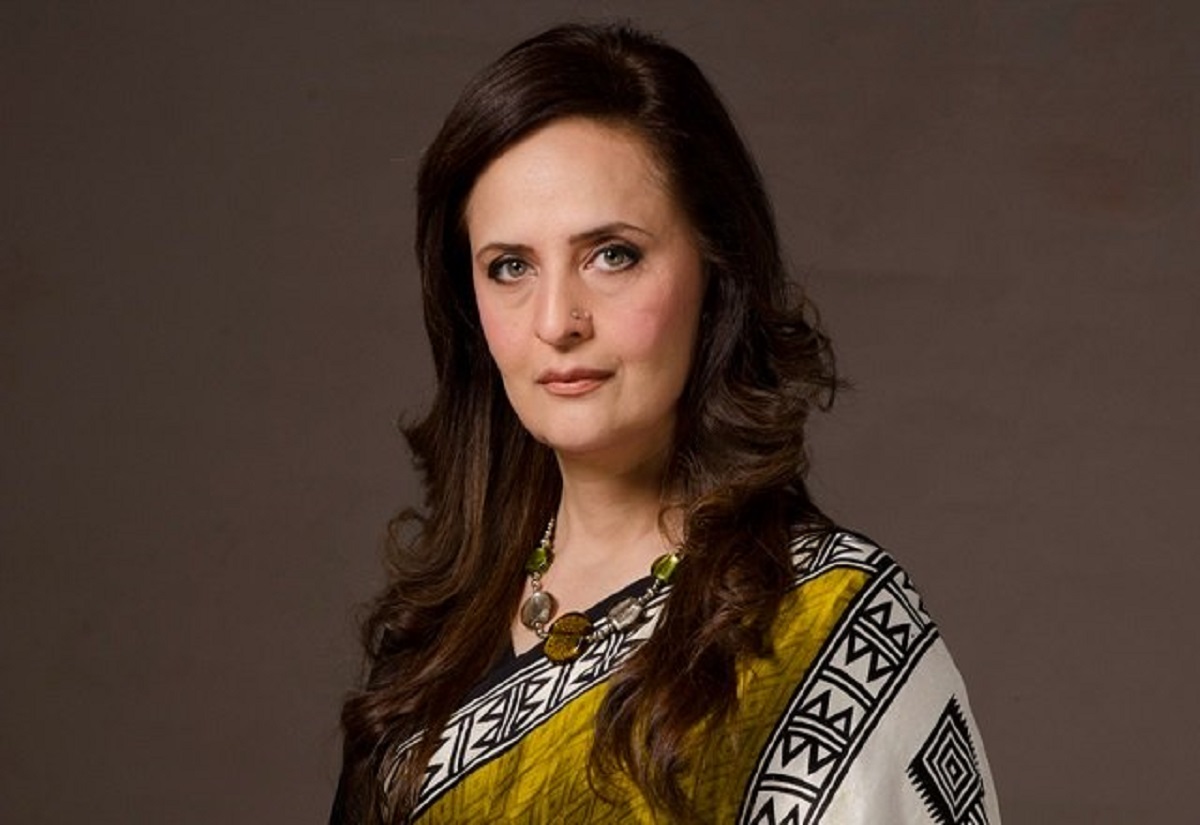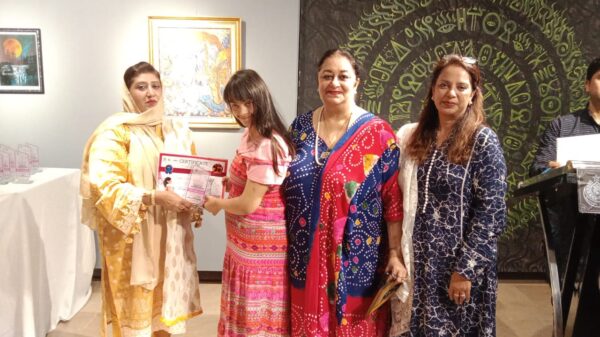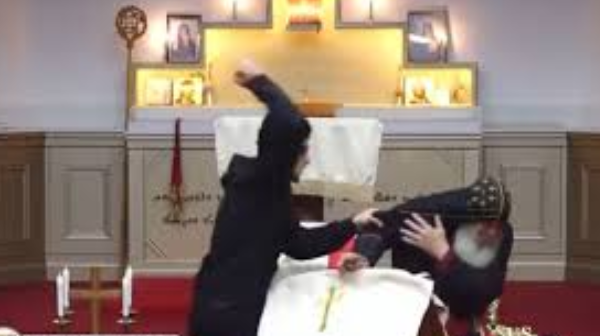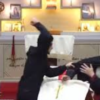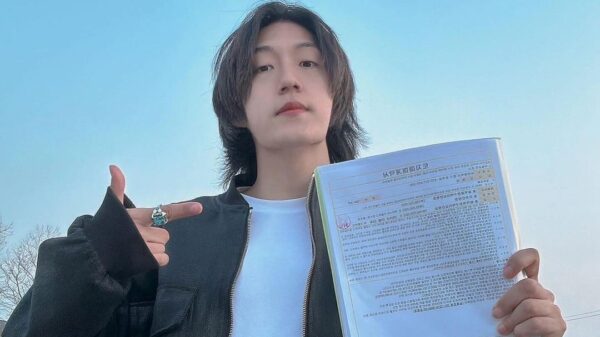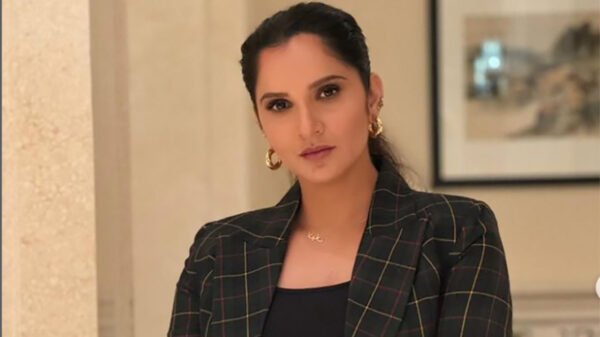Her statuesque looks and regal demeanour are the first things that one notices about her, followed by her kind hazel-coloured eyes and soft voice. Her keen intelligence and logic only come into play when she speaks or discusses an issue, but even then she is never more than soft-spoken. But don’t be fooled by the soft voice and looks.
Behind the beautiful and charming disposition is a woman of steely determination. Top it off with her acting prowess and you have Hina Khawaja Bayat, a person anyone would love to have on their side.
Hina is a person of many facets, though she may be known now for the characters she portrays on television. Acting, she says, literally fell into her lap. “I never planned to be an anchor or an actress on TV. I’m an industrial designer, and my first assignment was to do design for a talk show which covered art, architecture, fashion, anything that was creative. It lacked a host and I was cornered into hosting it.
“Shortly after that I left for the UK and, when I returned two years later, I did a programme for PTV called Baatein Mulaqaatein, followed by Uljhan Suljhan which was later renamed Geo Hina Ke Saath, a socio-political and economic programme.”
Behind her soft-spoken charm and striking looks, Hina Khawaja Bayat is an actor with a mind of her own. And she is not shy about expressing her strongly held views
Then, somehow, Hina Khawaja Bayat stepped into acting, “something totally alien to me,” she says. Hina was pointed out for a role for Hum TV’s Jhumka Jaan by programming director Imran Mehboob, who had seen her earlier work as an anchor.
In Jhumka Jaan, she played Nomaan Ejaz’s wife, the wife of a feudal whose husband is interested in another woman. It was a significant character, for which she received good feedback and she was further encouraged by artists Rubina Ashraf and Shagufta Ejaz.

In the wake of Jhumka Jaan came other offers, which led to Urraan and Manzil-i-Murad. With acting offers pouring in, Hina quit Geo Hina Ke Saath — which she also produced — and became a full-fledged actor, although she continued to work sporadically as an anchor. “But then I started getting very interesting and challenging roles, which were very difficult to refuse,” she says.
Bayat has been fortunate since her early career in getting very powerful roles and working with great writers and directors who give life to serials. She says that an understanding of the character and the cultural background helps her to give an edge in portraying the character realistically.
“I research my characters. Having been a journalist and anchor in the past comes in handy. [For example,] Tum Ho Kay Chup was a serial based on Baloch tribal culture in which I played the first wife of a tribal chief, enacted by the late Abid Ali. She is a refined Irani woman who escaped the revolution in Iran, a poetess who is imprisoned by traditions and bears the shackles of culture, and is buried alive when she rebels against them. The story was inspired by a real-life incident in Balochistan. It became a super-hit serial.”
Hina has essayed other powerful roles as well, including, for example, in Mehreen Jabbar’s serial Mera Naam Yusuf Hai, where she eventually divorces her domineering and conservative husband who is having an affair. In Dil Banjara she played a woman with a grown-up daughter who has a psychological disorder. Her portfolio of dramas include Mor Mahal, Mataye Jaan, Ishq Gumshuda and Shehrezade, all with strong female-centric characters.

Even mundane characters are brought to life with Bayat adding nuances that the writers leave out, such as her characters in Khuda Aur Mohabbat and Ishq Jalebi. “Stories come to life only with the realistic approach of the actor and an understanding director,” she adds.
Referring to Hina, director Sarmad Khoosat had once jokingly said that an educated artist can be a good thing but can also be a pain, after she worked with him in his film Manto.
What is Bayat’s take on the mundane, all-too-familiar topics of today’s serials? “Typical stories based on young heroines have been around for some time now. We have not projected women of depth, who are in their late 30s or 40s, women who have become strong with time. Unfortunately, we’re still carrying on with for the boy-girl formulaic romance.”
Her emphasis is on change, to start exploring characters that are older, and she feels the stories will automatically change as one gets out of the girl-meets-boy rut. “There should be diversity, as older age groups will have interesting stories. If a bahu [daughter-in-law] is a central character in a serial, why can’t a saas [mother-in-law] be one too?”
It’s a vicious circle with run-of-the-mill stories. Comedies need to be encouraged and written sensibly to impart messages in a suitable manner, such as in Aun Zaara and Ishq Jalebi, which dealt with the coronavirus pandemic in a hilarious way, and got good ratings.”
She laments the fact that a lot of channels are just churning out serials at breakneck speed, and the content is going down with writers having to produce content at a frenetic pace. “Even once-good writers are now writing typical scripts and content heads need to keep it in check. Unfortunately, such crass content is what’s popular with the masses these days and gets ads from multinationals, who instruct TV channels to force writers to keep following the same formula.

“It’s a vicious circle with run-of-the-mill stories. Comedies need to be encouraged and written sensibly to impart messages in a suitable manner, such as in Aun Zaara and Ishq Jalebi, which dealt with the coronavirus pandemic in a hilarious way, and got good ratings.”
Bayat has done very few films, focusing more on TV serials with meaty roles. Manto, in which she essayed a character from one of his short stories, was an exception, being more of an art film, as was the 2016 telefilm Aik Thi Marium based on the life of the Pakistan Air Force female fighter pilot Mariam Mukhtiar who embraced martyrdom in 2015. Hina played the role of Rehana Mukhtiar, Marium’s mother.
“I go for good characters but films do not have them. The pre-Covid-19 period was good, as films were doing well and gave hope for the revival of the film industry, but now all that has come to a halt unfortunately.”
Swivelling to the coronavirus pandemic, Hina Khawaja Bayat says Covid-19 has eroded every sphere of life, disrupting the lives and work of artists also. This was especially true last year, when a lot of people, including actors who were not well-off as well as technicians, make-up artists and vendors, lost work.
“Realising the dire situation after four months, we at Actors’ Collective Trust — the only government-registered and recognised body for Pakistani actors, of which I’m a founding member and treasurer — consulted the main stakeholders of production houses and drafted SOPs [standard operating procedures] for drama shoots, with the understanding that Covid-19 is long-term and we need to work with it.

“We are in the frontline and, as actors, we have to work without a mask and have physical contact, and thus have to be very vigilant. Production houses doing web-series are trying to get vaccination compulsory for everyone there. Protocols are followed, sanitising machines are being used, sanitising masks are being given out.”
On the positive side, Bayat admits that the pandemic has increased the viewership of Pakistani serials on television and the internet, since people are often confined to their homes and are turning more to them to keep themselves entertained.
However, with TV serials going through censorship and countless other hurdles, she thinks there’s a ray of hope in web-series, which are allowing people to tell stories that mainstream TV does not. Bayat predicts that web-series are going to get more popular with time.
“Stories in web-series need not necessarily be ‘bold’ in content, and should focus on everyday life in an entertaining way, without appearing meaningless,” she says. “I feel that web-series are the future, with smart phones getting more and more popular worldwide, and people across the globe have access to your work while cutting across barriers. Web-series are quick with limited episodes.” This is someone with an eye on more than just her acting work, I realise. “I will be doing three web-series in another two months,” she adds.
Of course, Hina has herself been part of some web-series already, including one (Churrails) that resulted in some notoriety for the blunt character she portrayed.
“Of the two web-series that I have done, Churrails was completely unconventional as far as mainstream drama is concerned, whereas Aik Jhooti Love Story was literally where all members of a family could relate to it. The common factor in both were the characters that were very real and relatable and existing in our society. Both series worked, though one was dark and the other was light-hearted.”
In Churrails, Bayat says she was lucky that Asim Abbasi gave her a choice of three characters and she opted for Sherry’s role as she’s a woman who very much exists in our society, a woman who has not had privileges in life and has made tough choices to succeed.
“The backlash that I got for playing Sherry in Churrails came mostly from the drama industry people. A controversy was created, but in this way Churrails became more popular with more and more people supporting me.”
Bayat’s staunch support of women’s and children’s rights stems from feeling strongly about the mistreatment women and children often face, and she frequently raises her voice against such injustices.
“Relating it to my work as an actor, I try to portray it sensitively in serials, such as when I’m playing a criminal-minded woman. I cannot glamourise injustice and such a character should be able to bring awareness amongst people, such as my character in Tum Kaun Piya, in which I play a mother-in-law who represents a mindset from hell, and who gets her retribution in the end.”
Hina firmly believes that, since artists have a voice and presence amongst the masses, they have a moral and social responsibility to uphold the right values. “Even something natural, such as speaking our own language, becomes important when people feel superior in speaking English rather than Urdu in front of others — feel proud of your language. Our religious beliefs and norms cannot be negated by us, as we are constantly in the public eye and we need to set an example,” she emphasises.
Given her strongly held views, I wonder where does Hina draw her inspiration from? The youngest of four sisters, Hina remained close to her mother and is still influenced by her tremendously.
“I used to think that I would die if Ammi wasn’t there, but life goes on. Having been so close to her — like a tich button — she not only shaped my mind and sensibilities, my activism comes from her too, as does my sense of right and wrong and being vocal about it is all because of her.
“My love for art, theatre, cinema, music comes from her too. I’m also very close to my sisters, their children are my children and this is very precious to me as I don’t have children of my own. My husband is my best friend and like a son to my father.”
It’s obvious that any mother would be proud of raising a daughter like Hina Khawaja Bayat.


